#autism symptoms
Text
Waiting mode is the most uncomfortable thing ever. I can't do anything, I can't relax, I can't play video games or anything until the thing I'm waiting for actually happens
#adhd#adhd problems#adhd hyperactive#adhd inattentive#neurodivergency#neurodivergent#adhd vibes#i have adhd#autism#autism symptoms#autistic#audhd#actually audhd
6K notes
·
View notes
Text
When I was younger, I thought I had a really big bladder. On 12 hour roadtrips, I’d only go to the bathroom like once and I’d rarely ever go at home. I thought I was built different.
Anyway, I have adhd and autism and I’ve been making myself drink water regularly and wow, have I always been this dehydrated? Have I been not going to the bathroom enough times to be considered healthy? I have overestimated my ability to gauge healthy behavior.
#god this explains a lot#adhd#autism#dysfunction#dehydration#adhd symptoms#autism symptoms#the inability to tell when we are hungry or thirsty
52 notes
·
View notes
Text

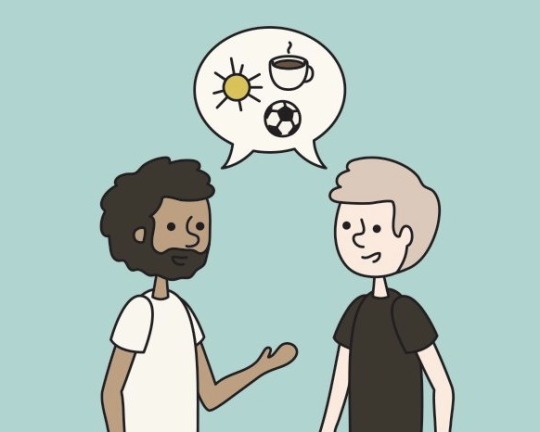

Ask box is open and I am taking poll suggestions
#fuck marry kill#fmk#fmk game#fmk poll#poll#polls#tumblr polls#autism#autism symptoms#autistic struggles#eye contact#small talk#clothing tags
29 notes
·
View notes
Text
do you guys ever just spend hours writing down pages of autism symptoms (+stims n other shit) you have and then proceed to doubt that your autistic
#like help???? i spent so long just hyperfocused on that tism research and now im just like??????#me??? autistic?? nahhh i mean maybe im just a nt who just has a few (A5) pages of autism symptoms and gets overly obsessed with shit a lot#but like seriously though what the fuck i even looked at the DSM5 and qualified for all the categories and im still here doubting this-#oh well i guess ill just try and talk to my psychologist about this when i see her next#autism#neurodivergent#autism symptoms#asd#AND THEN ALSO I HAVE A LOT OF ADHD SYMPTOMS SO IM LIKE WHAT IF ITS THE TISM(TM) OR WHAT IF ITS ADHD OR WHAT IF ITS BOTH OR WHAT IF ITS NONE#adhd#nd#and then even my autistic friends are like “yeah bestie you prolly have the tism” AND IM STILL DOUBTING IT???????#fml oml#now to hyperfocus on my special interests :33 and forget about this cause memory goes brrrrr
72 notes
·
View notes
Text
So maybe I'm not color blind and dyslexic, maybe it's just ANOTHER symptom of autism...
Apparently, like auditory processing disorder, visual processing disorder exist!
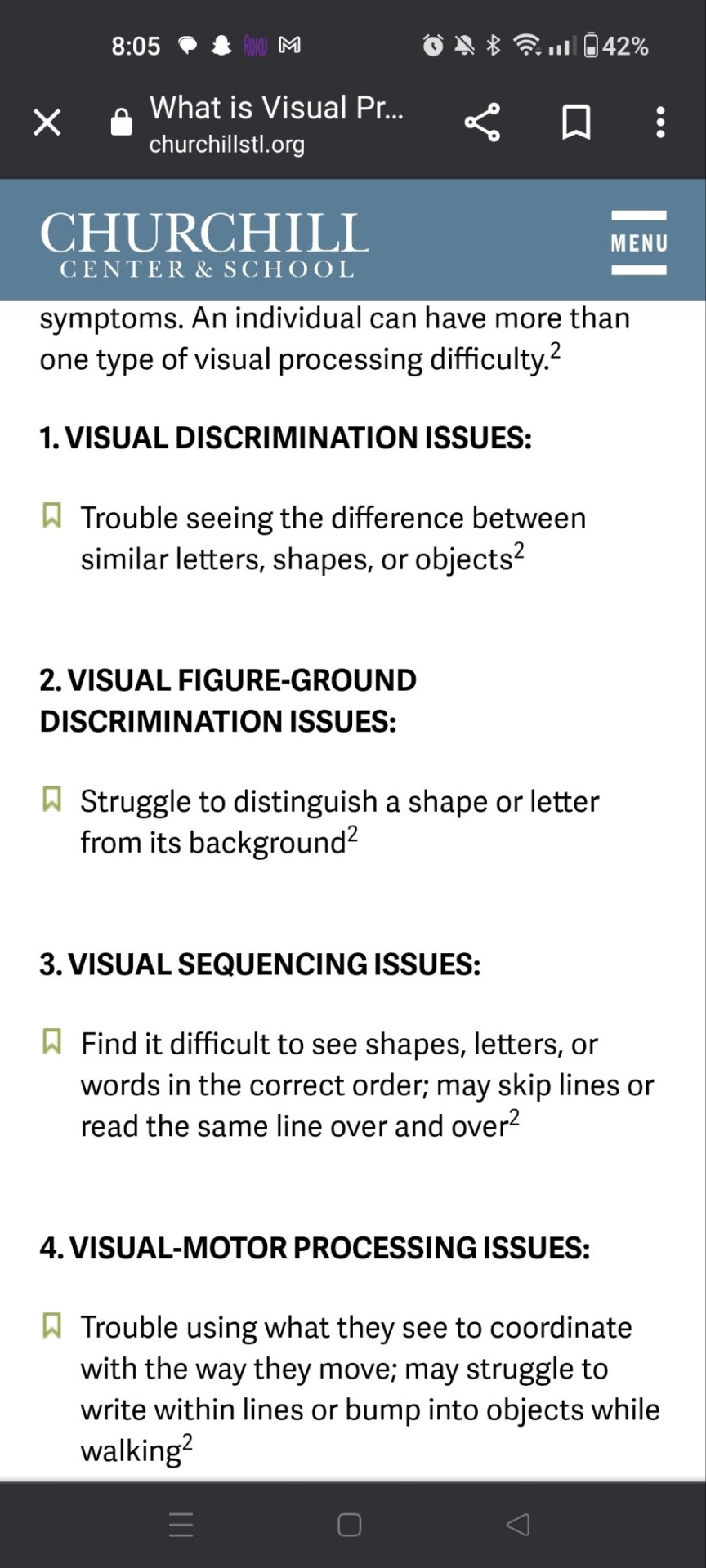
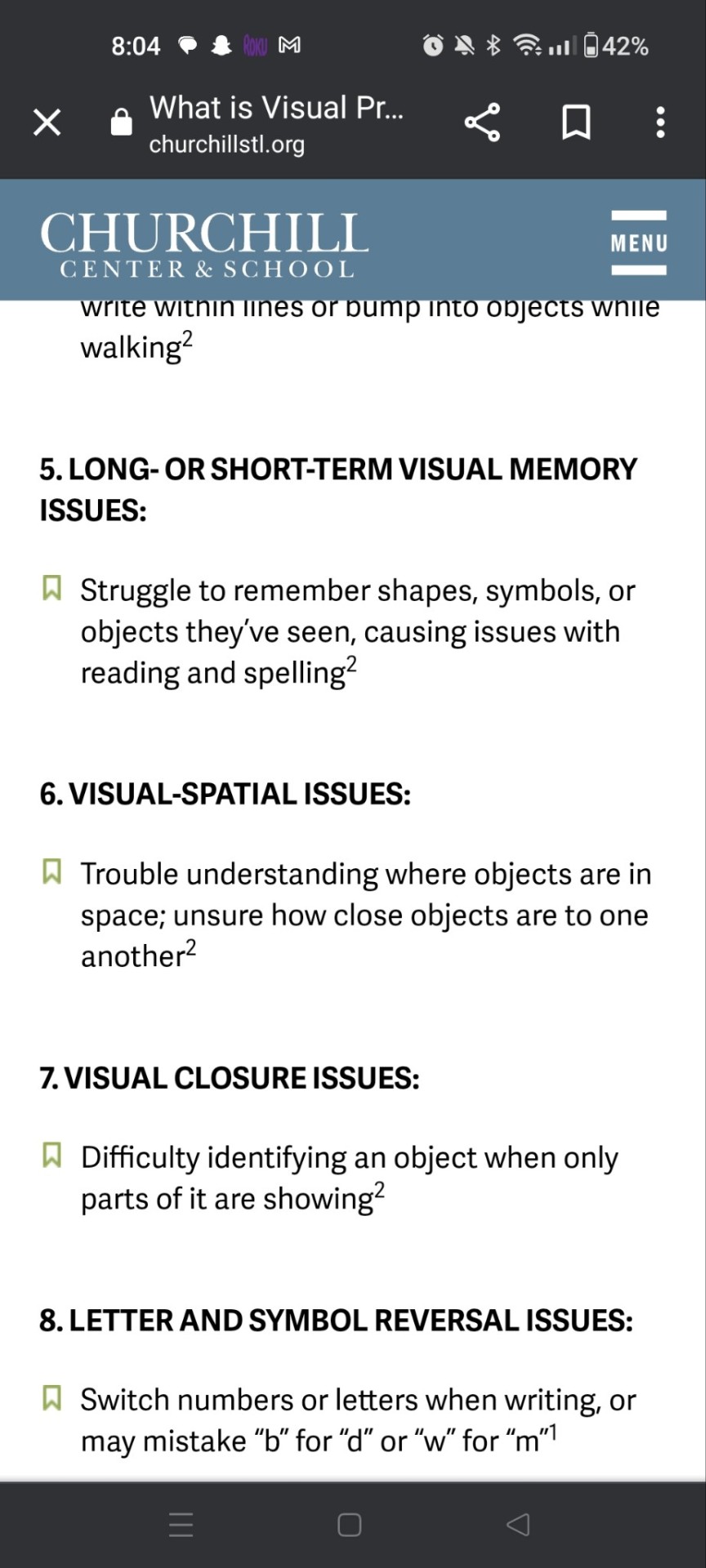
Image description:
1. VISUAL DISCRIMINATION ISSUES:
Trouble seeing the difference between similar letters, shapes, or objects2
2. VISUAL FIGURE-GROUND DISCRIMINATION ISSUES:
Struggle to distinguish a shape or letter from its background2
3. VISUAL SEQUENCING ISSUES:
Find it difficult to see shapes, letters, or words in the correct order; may skip lines or read the same line over and over2
4. VISUAL-MOTOR PROCESSING ISSUES:
Trouble using what they see to coordinate with the way they move; may struggle to write within lines or bump into objects while walking2
5. LONG- OR SHORT-TERM VISUAL MEMORY ISSUES:
Struggle to remember shapes, symbols, or objects they’ve seen, causing issues with reading and spelling2
6. VISUAL-SPATIAL ISSUES:
Trouble understanding where objects are in space; unsure how close objects are to one another2
7. VISUAL CLOSURE ISSUES:
Difficulty identifying an object when only parts of it are showing2
8. LETTER AND SYMBOL REVERSAL ISSUES:
Switch numbers or letters when writing, or may mistake “b” for “d” or “w” for “m”1
#visual processing disorder#autism things#autism spectrum disorder#autism symptoms#autism#adhd symptoms#adhd#audhd#vpd#apd#auditory processing disorder
47 notes
·
View notes
Text
Autism my bingo card

I am adding a rewatching show I've seen 100 times and relistening to songs I've heard many times
#autism#autistic#i have autism#actually autistic#autism symptoms#autistic life#neurodivergent#autistic community#autistic experiences#actually neurodivergent
24 notes
·
View notes
Text
Trying to figure out at what point something is and isnt a symptom of autism is like trying to figure out what family of animals the platypus belongs to.

just had to vent a bit because this issue keeps living rent free in my head since late 2020
#autism#autism symptoms#vent post#personal vent#platypus#autism diagnosis#hope no one gets mad about autism diagnosis being used as a tag but i feel like it belongs#aspergers
7 notes
·
View notes
Text
Having a super bad day so
TL;DR: Having autism is already playing life on hard mode, but some days it's really difficult to be autistic in this world....
They say I fit in fine and that they can't even tell and that it's never held me back and blah blah blah except they never include me in conversations or social gatherings because I say weird stuff, only like talking about the same 3 things, and speak out of turn.
.... Especially when you've gotten very good at masking.
People will say they don't care about the autism or they accept you or they understand or whatever. They'll claim they're completely okay and accepting until you start displaying basic and common symptoms of the disability because I'm only "high functioning" until my symptoms affect them personally.
They say I'm such a good and respectful kid (I'm a full grown adult btw) except when I ask genuine questions in a way that does not fit in with their ideals of how a society should run (I spoke with too much authority to a "superior" or simply don't do what I'm told without questioning it first). No then I'm disrespectful and leave a bad taste in people's mouths.
They say I'm pleasant to be around because I'm fairly quiet and even tempered, but when it takes me a full day to process an emotion and I shut down and start ignoring people, I'm suddenly rude and people can't stand to be around me because I take too much energy to deal with (??? Yeah it doesnt make sense to me either).
But most days I'm okay with being different. Most days I wear it as a badge of honor. Most days I have enough respect for myself to fill the empty void that should be respect from my peers.
And then I think.... Maybe it is me. I mean it literally is. I am different, so maybe I am just a nightmare to deal with. Maybe my failures to get along with people are entirely my fault. And yeah, it would be a lot easier if I were able to live on the same wavelength as a neurotypical. I would get in a lot fewer arguments and piss a lot fewer people off and be able to hold a conversation adequately and get my point across efficiently and make a lot less trouble and...
But here we are.
But some days I'm just not. Some days it eats away at me instead. And some days I just want to completely disappear. I don't fit in. I don't have friends. I make enemies very easily. I burn bridges without meaning to. I don't understand things that are apparently basic and normal to my allistic counterparts. And its exhausting. And it makes me wish I was someone else. Someone more capable of fitting into this world.
#autism#living with autism#actually autistic#autistic women#autistic adult#autistic problems#autistic experiences#mental health#mental heath awareness#autism struggles#asd#asd problems#mental health struggles#autistic poc#autistic life#autism symptoms#autistic representation#autistic rant#mental health problems#neurodiversity#neurodivergent#actually neurodiverse
144 notes
·
View notes
Text
Guys, would it be considered an autistic thing to do if I made a chart of my autistic symptoms?
#i did#i also have a list of my safe foods#i included symptoms i have#and symptoms i dont#id say its fairly big#autism shit#autism#autism symptoms#am i autistic?#who knows#probably
4 notes
·
View notes
Text
Autism is a developmental disability that happens within a person’s brain. Nobody knows for certain what causes this difference, but these differences don’t make your child look any different. Since there isn’t anything about how an autistic toddler looks that sets them apart, it’s important to understand the disability’s other signs and symptoms.
2 notes
·
View notes
Text
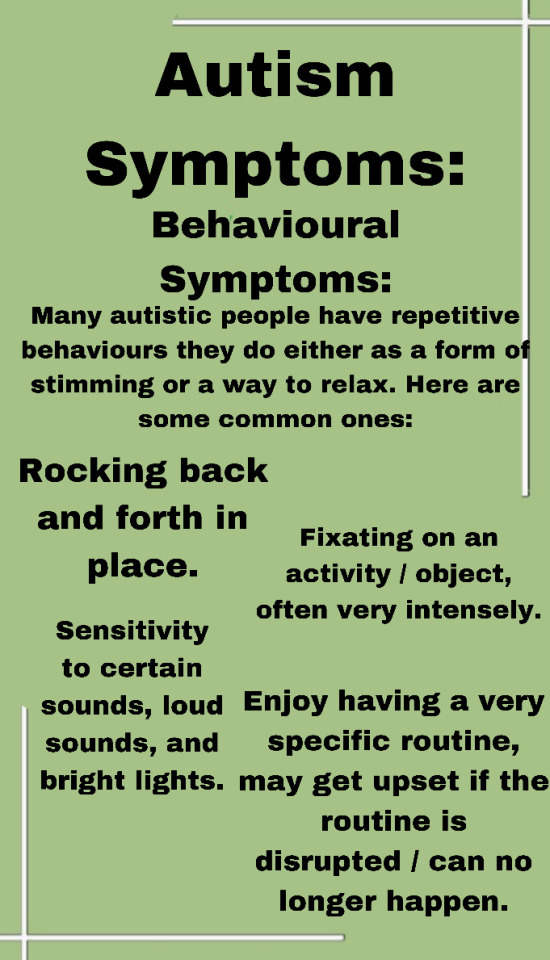
Just some of the behaviours that are present in some way / shape / form. As always, not every autistic person is going to experience the same symptoms the same amount, it is different for each individual person.
5 notes
·
View notes
Note
Which diagnostic criteria are you referencing when you say that ADHD and autism don't have an overlap? As far as I've seen, they do: sensory issues, perception, executive function issues, and so on.
I have two answers for you. The short answer is:
That is simply not true at all. Two Google searches ("autism DSM-V criteria" and "ADHD DSM-V criteria") can easily disprove that.
The long answer is as follows:
I saw you got diagnosed with ADHD recently and congrats! idk about your assessment, but mine didn't ask me about my sensory issues. Nor do they ask about my perception on social cues, or the way I understand things. Most of the questions were geared towards executive dysfunction, how my life has been affected BC I get distracted or the things I struggle with or questions about being hyperactive and impulsive.
Because those questions get the answers needed to see if someone meets the ADHD criteria. The only time they did ask questions about social cues, imagination, sensory issues etc etc was on the pre-assessment questionnaire I had to fill in, there was a part for an autism study,,, it wont even be used or brought up my assessment, it's just that some dude is working with the clinic doing a study.
The overlap that ppl are seeing/report on is more than likely due to the fact that ADHD and autism are comorbid and there are a lot more ppl who have both rather than one or the other. Some countries and areas will only give ppl the diagnosis for one of these and not let them get tested for the other. Other countries, such as Wales, won't let autism folks get annADHD diagnosis because the NHS there sees ADHD as a stepping stone to an autism diagnosis. Some healthcare systems only believe you can have one not both.
Outside of that, there will be people who are more affected by their autism than their ADHD and vice versa and don't realise they have both. So, for eg, when they see autistic people saying "oh, I have autism and I experience these things" and they relate to it,,, they assume it's because there's this massive overlap. But if the overlap was that great, it would be much harder to diagnose ppl with one or the other. It's more than likely that they need to do some research into autism away from the idea of "it's similar to ADHD" and see if they relate to it.
There are a lot of ppl with ADHD who refuse the idea of having autism BC deep down, they have a lot ableist beliefs about autism and it's time for the ADHD community to stop doing that.
TL;DR: ADHD and autism have two very distinct lists of criteria that don't overlap. Even the testing doesn't really focus on (if at all) the criteria for the other dx. Most ppl don't know they have both or think that it's a possibility BC they are (unknowingly) ableist towards autism, haven't read into ADHD properly, their healthcare system doesn't allow for both dx, the list goes on.
#adhd#adhd problems#adhd hyperactive#adhd inattentive#neurodivergency#neurodivergent#adhd vibes#autism symptoms#autistic#adhd autism solidarity#autsim
217 notes
·
View notes
Text
Anyone else besides me and my undiagnosed family members that feel comfort in watching stand up comedy due to the easy to read social cues that began as a mild obsession back in teenage years to help the feeling of transitioning out of childhood and realising that the world is less forgiving to someone whos autistic and now you can't play down the strange habits that only you seem to have and can't follow along with conversations so you watch these shows and follow along with the out of date references to feel a sense of belonging with people cause it's easier to react to these clips compared to real life?
#autism#autistic#autism symptoms#autistic adult#autistic children#autistic childhood#being autistic#autistic things#autistic feels#also thia but with scripts and/or acting as well#comedy#stand up#stand up comedy
10 notes
·
View notes
Text


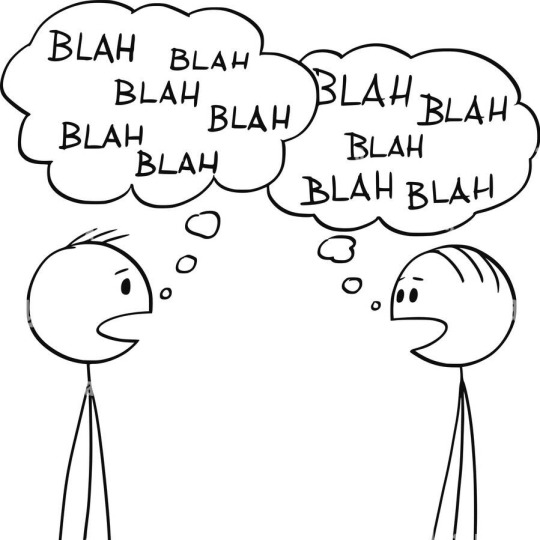
Ask box is open and I am taking poll suggestions
#fuck marry kill#fmk#fmk game#fmk poll#poll#polls#tumblr polls#autism#autism symptoms#autistic behavior#stimming#infodumping#echolalia
15 notes
·
View notes
Text
Signs of Autism in Toddlers
The signs of autism can vary from person to person. Some children display early signs of the disorder, while others don't show symptoms until they're older. But no matter what the age of your child, it's never too late to get a diagnosis and start getting the support they need to live their best life.
Early Signs of Autism in Babies
One of the earliest red flags of autism is an infant who doesn't interact with other babies as well as other babies their age. The baby may not smile back and forth or respond to names, and they may avoid eye contact with their parents.
This behavior isn't normal for an infant and should be reported to their healthcare provider during well-baby visits. Caregivers should also ask for tests to determine if a baby has an autism spectrum disorder.
Some early signs of autism include obsessive-compulsive behaviors such as lining up things in a particular order or preoccupation with a specific topic of interest. This can include memorizing facts about maps, trains, or sports statistics.
Performing repetitive behaviors such as flapping hands, rocking, or twirling can also be an early sign of autism in toddlers. Repeated movements like this can be soothing to the child, but they can also distract them from concentrating on other things.
Self-stimulatory Behaviors (or "stimming")
Some people with autism have very strong reactions to certain sensory stimuli, such as touch, taste, or smell. They may react quickly and intensely to these stimuli or they may respond very slowly and gently.
These responses can be more pronounced in toddlers with autism than in typically developing toddlers. For example, an autistic child with an obsession with light switches might flip them repeatedly or they might play with toys such as keys and rubber bands in unusual ways.
Other signs of autism in toddlers include difficulties interacting with other children and difficulty learning new social situations. These problems often improve with age, but some children will continue to have these issues throughout their lives.
The signs of autism in toddlers and young children can be subtle, but they can make it hard for family members to recognize the differences. For example, a young child with autism might prefer routines and be easily upset by changes in their daily schedules.
High-Functioning ASD
Many individuals with autism are diagnosed as having high-functioning autism, also known as Asperger's syndrome. These individuals can often be very bright and excel in school. They might have impressive vocabularies and a strong interest in particular topics or activities, such as art, music, or science.
They might also enjoy talking in an eccentric way, such as using a very wide range of vocabulary or constantly interrupting conversations with other people. This could be seen as a symptom of adult autism diagnosis, but it could also simply be an eccentricity.
A person with high-functioning autism might have a variety of different skills and be able to learn at a faster rate than other people their age. These skills might be a great benefit to the person with autism, but they can also be a barrier to social interaction.
#autism#autism symptoms#autism spectrum#signs of autism#symptoms of autism#autism in adults#adult autism#adult autism symptoms#is autism hereditary#autism therapy#autism levels#signs of autism in women#adult autism diagnosis#autism traits
16 notes
·
View notes
Text
Is it face blindness or do I avoid eye contact so much that I’m not looking at peoples faces to begin with?
#actually autistic#autistic community#autistic#autism symptoms#autism spectrum disorder#face blindness#eye contact
3 notes
·
View notes